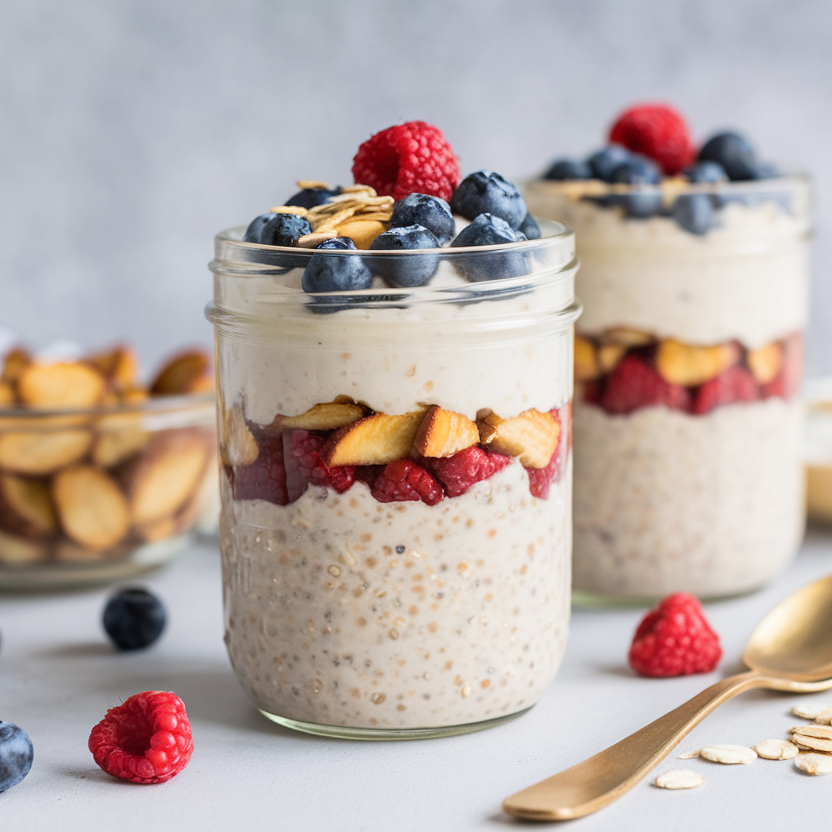Overnight oats have become a favorite for those looking for a quick, easy, and delicious breakfast that requires no cooking. But why exactly don’t you need to cook them? The secret lies in the process of soaking the oats, which softens them and makes them ready to eat without the need for heat. In this article, we’ll explore why you don’t need to cook overnight oats, the benefits of soaking vs. cooking, and common misconceptions about this popular breakfast.
What Are Overnight Oats?
Overnight oats are simply oats soaked in liquid overnight, allowing the oats to absorb the liquid and soften without cooking. The soaking process essentially “cooks” the oats without heat, breaking down the starches and making the oats easier to digest and enjoy.
Typically, old-fashioned rolled oats are used because they hold up well to soaking, while instant oats may become too mushy. You simply mix the oats with liquid, leave them in the fridge for several hours or overnight, and they are ready to eat by morning.
Why Don’t You Cook Overnight Oats?
The Science Behind Soaking vs. Cooking
The reason you don’t need to cook overnight oats lies in the soaking process. When oats soak in liquid over several hours, they absorb the liquid and soften, making them palatable and easier to chew. Soaking achieves the same goal as cooking: breaking down the oats’ starches to make them digestible, but without the use of heat.
Unlike cooking, soaking allows the oats to retain a slightly firmer texture, which many people find appealing. It also allows you to preserve the nutrients that may be lost through cooking at high temperatures.
Benefits of Soaking Instead of Cooking
There are several benefits to soaking oats rather than cooking them:
- Time-Saving: Soaking oats overnight means your breakfast is ready to eat as soon as you wake up. There’s no need to spend time cooking in the morning.
- Retains Texture: Soaked oats have a slightly chewy texture, unlike the creamier, softer texture of cooked oats. This makes them perfect for those who prefer more texture in their breakfast.
- Easy Customization: By not cooking the oats, you can mix in a variety of ingredients like fresh fruit, yogurt, or nuts without worrying about them getting soggy or overcooked.
- Cool and Refreshing: Overnight oats are typically eaten cold, which makes them a refreshing option for warmer months or for those who prefer a chilled breakfast.
Benefits of Soaking vs. Cooking Oats
1. Nutritional Preservation
One of the key benefits of soaking oats rather than cooking them is that the soaking process helps preserve the nutritional content of the oats. When oats are cooked, particularly at high temperatures, some nutrients, such as certain vitamins and enzymes, can be diminished. Soaking keeps more of these nutrients intact, ensuring you get the full benefit of the oats.
2. Time-Saving Convenience
Preparing oats the night before saves you precious time in the morning. Whether you have a busy schedule or prefer a no-cook breakfast, soaking oats allows you to prep a nutritious meal ahead of time. You can prepare multiple servings at once, store them in the fridge, and enjoy them throughout the week.
3. Texture Differences
Overnight oats offer a unique texture that is different from cooked oats. Soaked oats are slightly firmer and chewier compared to the soft, porridge-like consistency of cooked oats. This texture is preferred by many people who enjoy the distinct mouthfeel of cold oats. If you prefer your oats with more bite, soaking them is a better option.
4. Versatility and Customization
One of the greatest advantages of overnight oats is their versatility. You can easily mix in ingredients like chia seeds, flaxseeds, nut butter, or yogurt to add extra flavor, texture, and nutrients. Additionally, soaking overnight makes it easy to customize your oats with toppings like fresh berries, nuts, or granola in the morning.
The Role of Phytic Acid in Oats
Oats contain phytic acid, which can interfere with the absorption of certain nutrients like iron, calcium, and zinc. Soaking oats helps break down phytic acid, making these nutrients more bioavailable. This means your body can absorb more of the nutrients in the oats after they’ve been soaked compared to when they’re cooked.
Common Misconceptions About Overnight Oats
Despite the rising popularity of overnight oats, there are still some common misconceptions about them that need to be addressed.
Myth 1: Overnight Oats Are Uncooked and Unsafe
One misconception is that overnight oats are unsafe because they’re uncooked. However, soaking oats in liquid breaks down the starches and makes them safe to eat without cooking. The soaking process effectively “prepares” the oats, much like cooking does, but without using heat.
Myth 2: Cold Oats Aren’t Satisfying
Another misconception is that cold oats aren’t as satisfying as warm oats. While this might be true for some people, many others enjoy the cool, refreshing texture of overnight oats, especially during warmer months. If you prefer a warm breakfast, you can always heat up your soaked oats in the microwave before eating.
Myth 3: You Can’t Heat Overnight Oats
While overnight oats are typically eaten cold, you can certainly heat them up if you prefer a warm meal. Just pop them in the microwave for 30-60 seconds, and you’ll have a hot, comforting breakfast that still retains all the benefits of soaking.
Step-by-Step Guide to Making Perfect Overnight Oats
If you’re ready to try making your own overnight oats, here’s a simple step-by-step guide to get started.
1. Choosing the Right Oats
The best type of oats to use for overnight oats is old-fashioned rolled oats. These oats absorb liquid at the right rate and hold up well to soaking, providing a soft but chewy texture. Avoid using instant oats, as they tend to break down too much and become mushy.
2. The Liquid-to-Oat Ratio
The ideal ratio of liquid to oats is typically 1:1 or 1:1.5, depending on how creamy or thick you prefer your oats. For a creamier consistency, add more liquid. You can use a variety of liquids, including milk, almond milk, coconut milk, or even water.
3. Sweeteners and Flavorings
To enhance the flavor of your oats, add natural sweeteners like maple syrup, honey, or agave nectar. You can also mix in spices like cinnamon, nutmeg, or vanilla extract for added depth of flavor. These ingredients not only sweeten the oats but also give them a warm, comforting flavor.
4. Add-ins and Toppings
For extra flavor and texture, mix in chia seeds, flaxseeds, or nut butter when you prepare your oats. In the morning, add fresh toppings like berries, bananas, nuts, or granola to make your oats even more delicious.
Common Mistakes to Avoid When Making Overnight Oats
While overnight oats are easy to make, there are a few common mistakes that can affect the final outcome.
Mistake 1: Using Instant Oats
One of the biggest mistakes people make is using instant oats for overnight oats. Instant oats absorb liquid too quickly, which can result in a mushy texture. Stick with old-fashioned rolled oats for the best results.
Mistake 2: Adding Too Much Liquid
Another common mistake is adding too much liquid to your oats. This can make them too runny, diluting the flavor and texture. Be sure to use the right ratio of oats to liquid, typically 1:1 or 1:1.5, to get the perfect consistency.
Mistake 3: Not Adding Enough Flavor
Bland oats are often the result of not using enough sweeteners or spices. Make sure you add enough maple syrup, honey, or other sweeteners to balance the earthiness of the oats. Spices like cinnamon or vanilla extract can also enhance the flavor.
Mistake 4: Not Letting Oats Soak Long Enough
For the best texture, let your oats soak for at least 4-8 hours. Soaking them for too short a time will leave the oats too firm, while soaking them for too long may make them overly soft. Plan ahead and give your oats enough time to absorb the liquid fully.
FAQs: Understanding Overnight Oats
Can I Cook Overnight Oats If I Want To?
Yes, you can heat up overnight oats in the microwave if you prefer a warm breakfast. However, the point of overnight oats is to avoid cooking altogether, making them a convenient, no-cook option for busy mornings.
Are Overnight Oats Safe to Eat If Uncooked?
Yes, overnight oats are safe to eat uncooked. Soaking the oats softens them enough to make them easy to digest, similar to the effect of cooking.
Do Overnight Oats Taste Different From Cooked Oats?
Yes, overnight oats tend to have a chewier, slightly firmer texture compared to cooked oats, which are softer and creamier. The flavor is also different, with a cooler, refreshing taste that many people enjoy.
How Long Do Overnight Oats Need to Soak?
Overnight oats should soak for at least 4-8 hours to achieve the best texture. You can prepare them the night before and enjoy them the next morning.
Can I Freeze Overnight Oats for Later Use?
Yes, you can freeze overnight oats in single servings for later use. Just be aware that the texture may change slightly once thawed.
Conclusion: Why You Don’t Need to Cook Overnight Oats
The beauty of overnight oats lies in their simplicity. By soaking the oats overnight, you save time, preserve nutrients, and enjoy a unique texture that sets them apart from traditional cooked oats. With endless possibilities for customization and flavor, overnight oats are the perfect breakfast for those looking for a quick, nutritious meal without the hassle of cooking. Experiment with different flavors and toppings to find the combination that works best for you!

